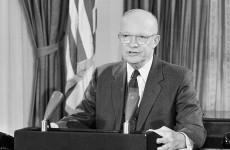Science
Catherine Connolly Raises Alarm on Military-Industrial Complex

During the first presidential debate on October 3, 2023, independent candidate Catherine Connolly expressed significant concern regarding the emerging military-industrial complex, particularly in Europe. Connolly highlighted the current military build-up in Germany, drawing parallels to the military expansions of the 1930s. “I’m extremely worried about the military-industrial complex that’s building up, particularly in Europe,” she stated. Her remarks echoed during discussions about the NFL’s close ties with the United States military, underscoring the complex’s pervasive influence in various sectors.
Connolly’s usage of the term “military-industrial complex” was pronounced, appearing five times throughout the debate hosted by Virgin Media. She emphasized the need for critical examination of the connections between military spending and various aspects of society. “We have to begin to question the military-industrial complex and its connections with everything,” she asserted.
Understanding the Military-Industrial Complex
The concept of a military-industrial complex refers to the intricate relationship between a nation’s armed forces and the businesses that supply them with military equipment and services. Although the term has been in use since the 1940s, it was notably popularized by former US President Dwight D. Eisenhower in his farewell address in 1961. Eisenhower warned of the implications of a growing military establishment, stating, “We have been compelled to create a permanent armaments industry of vast proportions.” He cautioned the American public about the potential for this industry to exert undue influence over government policy and priorities.
Eisenhower’s concerns have proven prescient in the decades that followed. The United States now spends more on its military than any other nation, with a budget of $997 billion in the previous year. In stark contrast, the second-highest military spender, China, allocated approximately $314 billion to its armed forces. This disparity highlights the significant role that the arms industry plays within the US economy.
Moreover, US arms companies are known to contribute to the election campaigns of politicians from both major parties, solidifying their influence within the political landscape. The arms industry not only generates substantial revenue but also serves as a major employer across the country. This growing interdependence raises concerns about the so-called “revolving door” phenomenon, where government officials transition to roles in private military corporations. Critics argue that this situation creates conflicts of interest, as former officials may negotiate arms contracts with their future employers, potentially skewing the allocation of military contracts.
Global Implications and European Concerns
Connolly’s remarks resonate with a broader conversation in Europe regarding increased defense spending and military collaboration among European Union member states. Critics, particularly on the left, have voiced similar apprehensions to those raised by Eisenhower over six decades ago. They caution against an escalating arms race and the potential ramifications for European security and economic stability.
The relationship between military spending and public perception is further complicated by its integration into everyday life. For instance, the NFL’s partnership with the US military exemplifies how military presence permeates various aspects of American culture, reinforcing the military-industrial complex’s visibility and influence.
As discussions surrounding military expenditure continue to evolve, Connolly’s insights serve as a reminder of the importance of scrutinizing the dynamics at play between defense spending, economic interests, and political power. With military budgets on the rise globally, the implications of these relationships warrant careful consideration by policymakers and citizens alike.
The ongoing dialogue initiated by candidates like Connolly reflects a crucial engagement with the potential consequences of a robust military-industrial complex in shaping not just national policy, but also international relations in a rapidly changing world.
-

 Top Stories3 months ago
Top Stories3 months agoTributes Surge for 9-Year-Old Leon Briody After Cancer Battle
-

 Entertainment4 months ago
Entertainment4 months agoAimee Osbourne Joins Family for Emotional Tribute to Ozzy
-

 Politics4 months ago
Politics4 months agoDanny Healy-Rae Considers Complaint After Altercation with Garda
-

 Top Stories4 months ago
Top Stories4 months agoIreland Enjoys Summer Heat as Hurricane Erin Approaches Atlantic
-

 World5 months ago
World5 months agoHawaii Commemorates 80 Years Since Hiroshima Bombing with Ceremony
-

 Top Stories3 months ago
Top Stories3 months agoNewcastle West Woman Patricia Foley Found Safe After Urgent Search
-

 Top Stories5 months ago
Top Stories5 months agoFianna Fáil TDs Urgently Consider Maire Geoghegan-Quinn for Presidency
-

 World5 months ago
World5 months agoCouple Convicted of Murdering Two-Year-Old Grandson in Wales
-

 World5 months ago
World5 months agoGaza Aid Distribution Tragedy: 20 Killed Amid Ongoing Violence
-

 World5 months ago
World5 months agoAristocrat Constance Marten and Partner Convicted of Infant Murder
-

 Top Stories4 months ago
Top Stories4 months agoClimbing Errigal: A Must-Do Summer Adventure in Donegal
-

 Top Stories4 months ago
Top Stories4 months agoHike Donegal’s Errigal Mountain NOW for Unforgettable Summer Views









